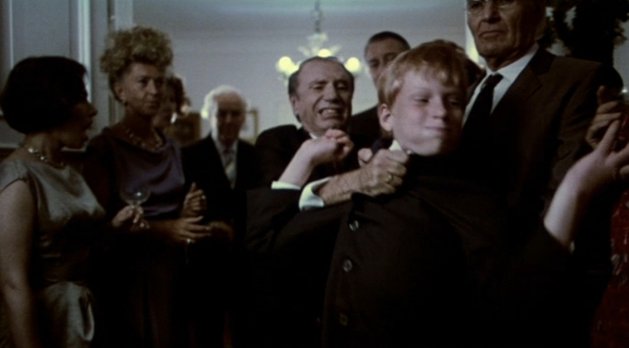 First released in Germany as Jenseits Der Stille, Beyond Silence is the story of Lara, a hearing child of deaf parents Martin and Kai. (The parents converse in German Sign Language, but since the actors who play them are American and French, I have it on good authority that their signing is accented.)
First released in Germany as Jenseits Der Stille, Beyond Silence is the story of Lara, a hearing child of deaf parents Martin and Kai. (The parents converse in German Sign Language, but since the actors who play them are American and French, I have it on good authority that their signing is accented.)
Frequently called upon to serve as sign language interpreter for her parents, young Lara translates meetings, parent-teacher conferences, soap operas, and phone calls for them (though they have a TTY, they are only seen using it once). It is not a good idea to have a child acting in this capacity, though, as Lara avoids translating anything that will get her in trouble or cause a conflict. Martin and Kai realize they’re being fooled, but only bemoan the lack of professional interpreters.
Furthermore, Martin constantly asks what things–flags, snow, the sunset–sound like, and Lara gamely tries to describe them in terms he can understand. “What would we do without you and your ears?” he asks Lara affectionately.
Lara insists that her mother Kai learn to ride a bicycle, telling her “Every real mother can ride a bike.” Despite inner ear balance problems, Kai practices in a meadow.
Martin and his sister Clarissa have a strained relationship stemming from a childhood incident where Martin began laughing hysterically during one of her clarinet recitals. Clarissa resents Martin for the way he was allowed to misbehave without consequence, not realizing young Martin acted out of frustration at his inability to communicate with anyone in his family. His own parents were advised not to learn or teach him sign, as the prevailing wisdom of the times was that it would make them less likely to read lips or learn speech.
Though early in the movie we see Martin fixing and adjusting a radio for Lara to listen to, when Clarissa gives Lara a coveted clarinet he worries that he’ll lose her affections and sours on the idea of having music in the house. From then on, any time she turns the radio on or tries to practice her clarinet, he orders that the noise be stopped. This only furthers Lara’s attachment to Clarissa, and once Lara is older Clarissa invites her to stay with her in Berlin so she can practice for an audition at a music conservatory. Martin is furious, but the family overrules him.
While in Berlin, Lara happens to see a man and a young girl conversing in sign at the market, and follows them to strike up a conversation. She initially assumes she’s seeing a girl much like herself, but discovers the little girl is deaf while the hunky guy is her elocution teacher. Like Lara, Tom is a hearing child of deaf parents; though he seems a bit better adjusted than she. He talks about Gallaudet with reverence, saying that “The Americans recognize [sign] as a language. They’re at least 20 years ahead of us.”
Tom suggests Lara become a teacher for the deaf as well, but Lara happens to attend a concert and falls in love with klezmer music. Her future career decided, she prepares to audition for a conservatory. Her relationship with Tom blooms while her relationship with Martin continues to deteriorate. But a sudden death in the family forces a confrontation, and the strength and stability Lara has begun to learn from Tom leads her to understand her father better. They reconcile as they talk across the auditorium while she auditions, Martin saying “I may not be able to hear it, but I’ll try to “understand” it.” Perhaps he’ll always rely on Lara and sister Marie to interface with the hearing, but at last the family has realized the folly of trying to force their children into their respective worlds.




